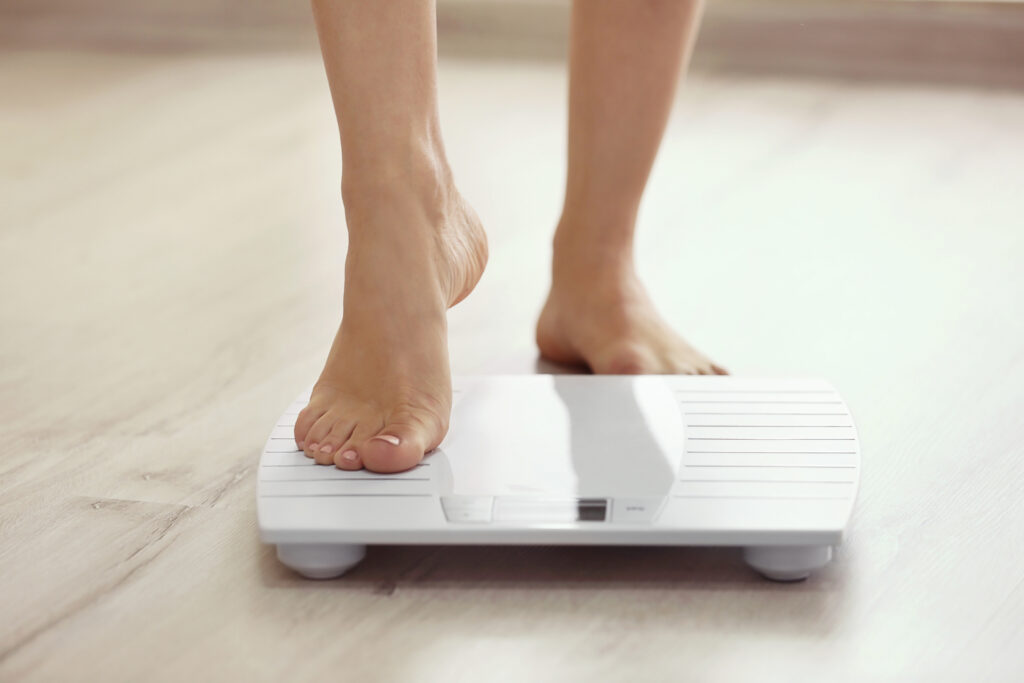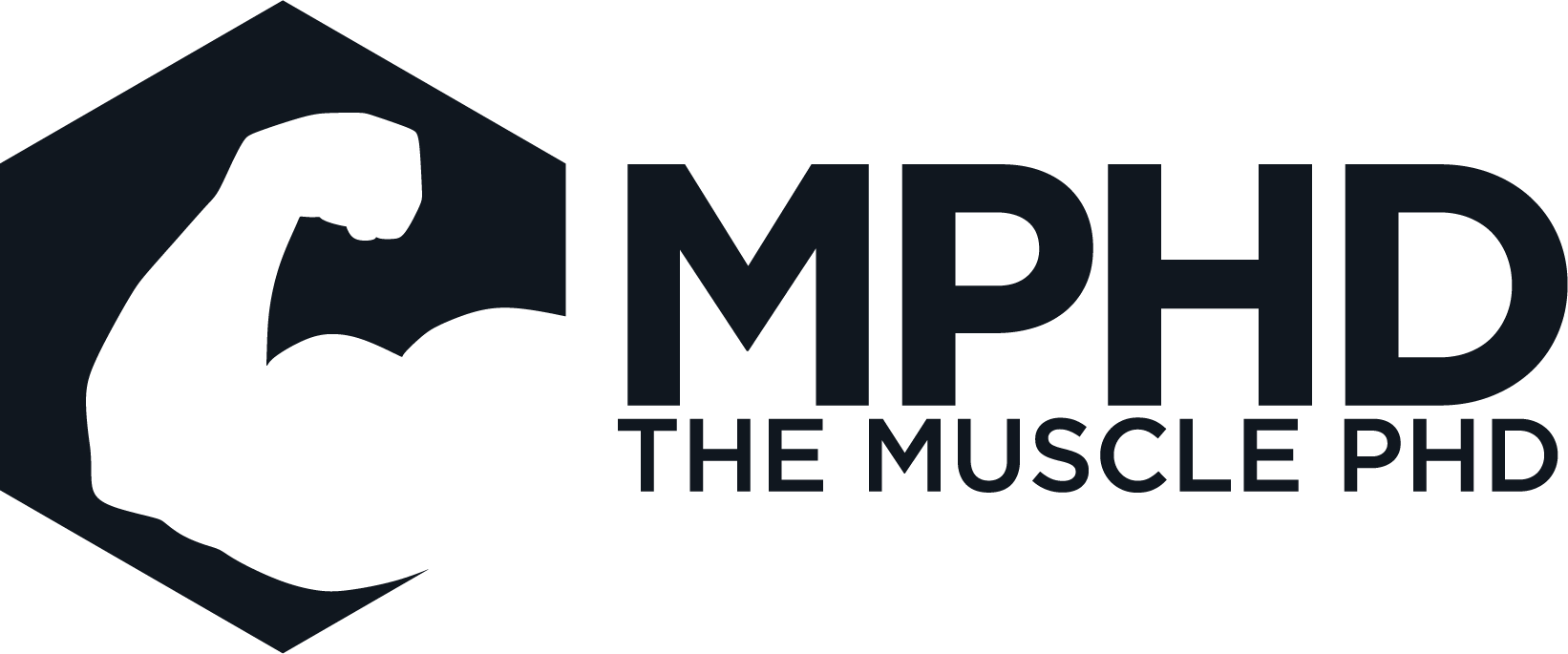Introduction
As of the writing of this article, we’re about a few weeks into spring and many a gym bro and brodette are getting ready to shed their winter bulk to display their newly chiseled physiques. We often get questions about body recomposition around this time of year; everyone spent a tough three winter months building slabs of muscle in the gym and most of us don’t want to turn around and lose that precious muscle tissue during our summer cut.
With this in mind, what’s the fix? Is it possible to lose fat without losing muscle? Can you even gain muscle while losing fat? Let’s discuss.
How does Weight Loss Work?
 First, we need to talk about general weight loss. Weight loss is kind of one of those buzzword phrases – it doesn’t take long to come across a news article or magazine cover discussing weight loss and how to achieve it. While most people know that consistently burning more calories than you consume results in losing weight, the actual process for achieving this can be far more complex than a simple calculation.
First, we need to talk about general weight loss. Weight loss is kind of one of those buzzword phrases – it doesn’t take long to come across a news article or magazine cover discussing weight loss and how to achieve it. While most people know that consistently burning more calories than you consume results in losing weight, the actual process for achieving this can be far more complex than a simple calculation.
In short, the food we eat contains energy, in the form of kilocalories (or calories, for short). We use this energy to support our daily activities, normal physiological functioning, and any kind of exercise-related activity. When we don’t use as much energy as we take in, we store the excess energy as body fat so it can be used later. Well, when does later come?
If we, purposefully or not, end up not eating enough food to support our daily activity or exercise, our bodies can mobilize this stored fat tissue to provide energy. However, our bodies can also utilize skeletal muscle to provide energy and can even break down skeletal muscle to provide amino acids for the protein synthesis process in other parts of the body (Wolfe, 2005). Since dieting often involves reducing caloric intake, oftentimes people get trapped by not consuming enough protein during their diet. In turn, this can result in muscle loss due to the aforementioned.
In addition, consistently consuming a low-calorie diet and losing weight can result in a hormonal environment that is not particularly suited for maintaining or even building muscle (Barakat et al., 2020; Sumithran et al., 2011). In fact, virtually every weight loss study involves subjects losing both muscle and fat during a diet. And the primary culprits for this outcome include people not consuming enough protein (Josse et al., 2011) or not performing any resistance training during their diet (de Souza et al., 2012).
Since this all sounds concerning, how can body recomp even be possible?
Is Body Recomp Possible?
Essentially, body recomp is the process of losing fat and maintaining, or even gaining, muscle mass. Now, many folks in the bodybuilding field will try to tell you that this process is either A) impossible or B) only reserved for beginners. However, this isn’t entirely true.
We have multiple studies showing that body recomposition is possible (Antonio et al., 2015; Arazi et al., 2011; Campbell et al., 2018; Cribb et al., 2006; Haun et al., 2018; Josse et al., 2011; Rauch et al., 2018). In addition, we even have studies showing that nutrition only interventions (no training!) can also lead to body recomposition (Arciero et al., 2013; Bray et al., 2015).
While the above paragraph just looks like a bunch of names and dates, it’s important to bear in mind that there is a chunk of evidence supporting body recomposition as a realistic outcome – even in trained individuals (Antonio et al., 2015; Campbell et al., 2018; Haun et al., 2018; Rauch et al., 2018). While this handful of studies certainly isn’t overwhelming evidence, we also have to consider the fact that most research studies utilize pretty weak training programs and oftentimes don’t control for dietary intake.
Okay, so we do have some evidence for body recomp. How exactly does it work, then?
Can I Lose Fat Without Losing Muscle?
We just listed several studies that proved it’s possible to lose fat without losing muscle. Heck, some of these studies even had subjects gain muscle while losing fat. It is possible! However, there are going to be a few rules for setting yourself up for potential recomp success:
- Virtually every study that resulted in body recomposition had subjects consume a high protein diet; of the six studies we’ve included (Antonio et al., 2015; Arciero et al., 2013; Bray et al., 2015; Campbell et al., 2018; Cribb et al., 2006; Haun et al., 2018), the average protein intake was 2.56g/kg/day (1.16g/lb/day). A recent review on protein intake (Morton et al., 2018) recommended an intake of 1.62g/kg/day to “optimize” muscle gains. Therefore, to recomp, you might be looking at an additional 58% protein intake compared to that recommendation.
- Some of the studies in which subjects were able to recomp also included REAL training programs! Antonio et al. (2015), Campbell et al. (2018), and Haun et al. (2018) had subjects perform pretty high-volume training and much more frequent training compared to many other training studies. Keep in mind that most training studies have subjects workout about 2-3x/week whereas the aforementioned trio had subjects training 3-5x/week; the study in which subjects only trained 3x/week (Haun et al., 2018) utilized full body workouts each day which would still result in a high training frequency for the major muscle groups.
- One area where many studies overlook is sleep. One seminal study from Nedeltcheva et al. (2010) actually found that subjects sleeping 8.5-hrs per night lost more fat than a group sleeping 5.5-hrs per night. Interestingly, both groups lost the same total amount of weight, but the 5.5-hr/night group lost a good chunk of their weight as muscle (80% versus 48% in the 8.5-hr group). Keep in mind, that subjects in this study only consumed 1.18g/kg/day of protein and they didn’t exercise. Hence the significant loss in muscle in both groups.
 A similar study from Wang et al. (2018) restricted an hour of sleep 5 nights/week in one group of overweight adults while a control group maintained their normal sleeping schedule. The results? Both groups lost the same amount of weight (3.2kg), but the sleep restricted group lost proportionally more muscle mass than the normal sleep group.
A similar study from Wang et al. (2018) restricted an hour of sleep 5 nights/week in one group of overweight adults while a control group maintained their normal sleeping schedule. The results? Both groups lost the same amount of weight (3.2kg), but the sleep restricted group lost proportionally more muscle mass than the normal sleep group.
A third study examined two groups of subjects performing a resistance training protocol, but one group also received a sleep education program designed to improve sleep habits and outcomes (Jabekk et al., 2020). Both groups ended up gaining similar amounts of muscle from the training program (1.7 vs. 1.3kg), but the sleep education group also lost a significant amount of body fat (-1.8kg vs. +0.8kg). We now have three studies showing the importance of sleep for body composition, so always be mindful of your sleep quality when trying to recomp.
Therefore, if you’re trying to body recomp, make sure you’re doing the following:
1) Consume at least 2.2g of protein/kg of bodyweight (1g/lb). Remember, you need a higher dietary protein intake in order to maintain muscle during a cut – let alone gain muscle.
2) Train hard and keep training heavy. Keep giving your body a mechanical stimulus that forces it to maintain muscle. The minute you drop to lighter weights, you stop giving the body a reason to stay jacked.
3) Sleep, sleep, sleep! Try to get 8-hours of sleep every day. Shoot for at least 80-90% of this sleep overnight, and then add naps throughout the day if needed (Bompa & Buzzichelli, 2018).
4) We also recommend making sure you’re hydrated. Dehydration can actually cause similar fluctuations in anabolic/catabolic hormones when compared to chronic low-calorie diets – i.e. reduced testosterone and increased cortisol (Judelson et al., 2008). Sip on water throughout the day and keep sipping throughout your workout to ensure proper hydration.
Do you Need to be in a Calorie Deficit to Recomp?
Ultimately, it is possible to recomp without reducing calorie intake. Heck, some of the recomp studies we’ve mentioned even had people eating in a planned surplus (Antonio et al., 2015; Haun et al., 2018). Keep in mind, though, that both of those studies had higher protein intakes (>2.3g/kg/day) which created the surplus – and they trained subjects extremely hard. The Haun et al. (2018) study had subjects gain more absolute muscle mass than their absolute loss in fat mass (+2.9 vs. -1.0kg) whereas the Antonio et al. (2015) study saw subjects gain the same absolute amount of muscle as their fat loss (+1.6 vs. -1.5kg). However, these studies are really the only ones of their kind so far, so we look forward to seeing more data on deficits/surpluses and body recomposition. Since the Haun et al. (2018) subjects did, indeed, gain weight, they were certainly in a surplus. However, the Antonio et al. (2015) subjects were likely closer to maintenance.
A true recomp would involve eating right around your maintenance calories. With this, you’d be losing fat and gaining muscle at a similar rate and, therefore, staying at the same body weight. How do you find your maintenance calories? Track your food intake for a week. Did you stay the same weight? Your average daily intake from that week is probably a good estimate of your maintenance calories.
 If you eat in a calorie deficit, you’re going to have a tougher time gaining muscle during your cut. You can certainly maintain muscle but gaining muscle will be harder. Recent estimates paint the energy cost of building muscle at around 360-480 calories per day (Slater et al., 2019). If you’re not eating at least close to maintenance calories, it’s going to be hard to come up with the energy to build muscle. If you truly want to cut, I’d plan on consuming a slight calorie deficit while maintaining the previously mentioned recomp guidelines in the above section. That will help you maintain muscle as much as possible while shredding fat. I’ve included the DXA rate of change of one of our ASPI clients who followed a recomp plan to a T. In a 3-month period, he lost almost 6kg of fat mass and maintained muscle mass. Maintaining muscle in a deficit is certainly possible, just lift heavy and eat your protein!
If you eat in a calorie deficit, you’re going to have a tougher time gaining muscle during your cut. You can certainly maintain muscle but gaining muscle will be harder. Recent estimates paint the energy cost of building muscle at around 360-480 calories per day (Slater et al., 2019). If you’re not eating at least close to maintenance calories, it’s going to be hard to come up with the energy to build muscle. If you truly want to cut, I’d plan on consuming a slight calorie deficit while maintaining the previously mentioned recomp guidelines in the above section. That will help you maintain muscle as much as possible while shredding fat. I’ve included the DXA rate of change of one of our ASPI clients who followed a recomp plan to a T. In a 3-month period, he lost almost 6kg of fat mass and maintained muscle mass. Maintaining muscle in a deficit is certainly possible, just lift heavy and eat your protein!
Conclusion
All-in-all, body recomposition is certainly a possibility. Just about everyone agrees that it’s probably easier for a novice to achieve than a veteran (Barakat et al., 2020), but that doesn’t mean it’s impossible for experienced bodybuilders. Consuming plenty of protein, training hard, sleeping well, and staying hydrated will offer your best chance for recomposition glory.
Lastly, this is another article we’re leaving in true APA format. We know this gives the article a nastier, wordier appearance, but it’s important as this is a developing topic and, hopefully, we’ll be able to add more to this piece as new data emerge.
References
- Antonio, J., Ellerbroek, A., Silver, T., Orris, S., Scheiner, M., Gonzalez, A., & Peacock, C. A. (2015). A high protein diet (3.4 g/kg/d) combined with a heavy resistance training program improves body composition in healthy trained men and women–a follow-up investigation. Journal of the International Society of Sports Nutrition, 12(1), 1-9.
- Arazi, H., Faraji, H., Moghadam, M. G., & Samadi, A. (2011). Effects of concurrent exercise protocols on strength, aerobic power, flexibility and body composition. Kinesiology, 43(2.), 155-162.
- Arciero, P. J., Ormsbee, M. J., Gentile, C. L., Nindl, B. C., Brestoff, J. R., & Ruby, M. (2013). Increased protein intake and meal frequency reduces abdominal fat during energy balance and energy deficit. Obesity, 21(7), 1357-1366.
- Barakat, C., Pearson, J., Escalante, G., Campbell, B., & De Souza, E. O. (2020). Body Recomposition: Can Trained Individuals Build Muscle and Lose Fat at the Same Time? Strength & Conditioning Journal, 42(5), 7-21.
- Bompa, T. O., & Buzzichelli, C. (2018). Periodization-: theory and methodology of training. Human Kinetics. Champaign, IL.
- Bray, G. A., Redman, L. M., de Jonge, L., Covington, J., Rood, J., Brock, C., … & Smith, S. R. (2015). Effect of protein overfeeding on energy expenditure measured in a metabolic chamber. The American Journal of Clinical Nutrition, 101(3), 496-505.
- Campbell, B. I., Aguilar, D., Conlin, L., Vargas, A., Schoenfeld, B. J., Corson, A., … & Couvillion, K. (2018). Effects of high versus low protein intake on body composition and maximal strength in aspiring female physique athletes engaging in an 8-week resistance training program. International Journal of Sport Nutrition and Exercise Metabolism, 28(6), 580-585.
- Cribb, P. J., Williams, A. D., Carey, M. F., & Hayes, A. (2006). The effect of whey isolate and resistance training on strength, body composition, and plasma glutamine. International Journal of Sport Nutrition and Exercise Metabolism, 16(5), 494-509.
- de Souza, R. J., Bray, G. A., Carey, V. J., Hall, K. D., LeBoff, M. S., Loria, C. M., … & Smith, S. R. (2012). Effects of 4 weight-loss diets differing in fat, protein, and carbohydrate on fat mass, lean mass, visceral adipose tissue, and hepatic fat: results from the POUNDS LOST trial. The American Journal of Clinical Nutrition, 95(3), 614-625.
- Haun, C. T., Vann, C. G., Mobley, C. B., Roberson, P. A., Osburn, S. C., Holmes, H. M., … & Roberts, M. D. (2018). Effects of graded whey supplementation during extreme-volume resistance training. Frontiers in Nutrition, 5, 84.
- Jåbekk, P., Jensen, R. M., Sandell, M. B., Haugen, E., Katralen, L. M., & Bjorvatn, B. (2020). A randomized controlled pilot trial of sleep health education on body composition changes following 10 weeks resistance exercise. The Journal of Sports Medicine and Physical Fitness.
- Josse, A. R., Atkinson, S. A., Tarnopolsky, M. A., & Phillips, S. M. (2011). Increased consumption of dairy foods and protein during diet-and exercise-induced weight loss promotes fat mass loss and lean mass gain in overweight and obese premenopausal women. The Journal of Nutrition, 141(9), 1626-1634.
- Judelson, D. A., Maresh, C. M., Yamamoto, L. M., Farrell, M. J., Armstrong, L. E., Kraemer, W. J., … & Anderson, J. M. (2008). Effect of hydration state on resistance exercise-induced endocrine markers of anabolism, catabolism, and metabolism. Journal of Applied Physiology, 105(3), 816-824.
- Morton, R. W., Murphy, K. T., McKellar, S. R., Schoenfeld, B. J., Henselmans, M., Helms, E., … & Phillips, S. M. (2018). A systematic review, meta-analysis and meta-regression of the effect of protein supplementation on resistance training-induced gains in muscle mass and strength in healthy adults. British Journal of Sports Medicine, 52(6), 376-384.
- Nedeltcheva, A. V., Kilkus, J. M., Imperial, J., Schoeller, D. A., & Penev, P. D. (2010). Insufficient sleep undermines dietary efforts to reduce adiposity. Annals of Internal Medicine, 153(7), 435-441.
- Rauch, J. T., Loturco, I., Cheesman, N., Thiel, J., Alvarez, M., Miller, N., … & De Souza, E. O. (2018). Similar strength and power adaptations between two different velocity-based training regimens in collegiate female volleyball players. Sports, 6(4), 163.
- Slater, G. J., Dieter, B. P., Marsh, D. J., Helms, E. R., Shaw, G., & Iraki, J. (2019). Is an energy surplus required to maximize skeletal muscle hypertrophy associated with resistance training? Frontiers in Nutrition, 6, 131.
- Sumithran, P., Prendergast, L. A., Delbridge, E., Purcell, K., Shulkes, A., Kriketos, A., & Proietto, J. (2011). Long-term persistence of hormonal adaptations to weight loss. New England Journal of Medicine, 365(17), 1597-1604.
- Wang, X., Sparks, J. R., Bowyer, K. P., & Youngstedt, S. D. (2018). Influence of sleep restriction on weight loss outcomes associated with caloric restriction. Sleep, 41(5), zsy027.
- Wolfe, R. R. (2005). Regulation of skeletal muscle protein metabolism in catabolic states. Current Opinion in Clinical Nutrition & Metabolic Care, 8(1), 61-65.
From being a mediocre athlete, to professional powerlifter and strength coach, and now to researcher and writer, Charlie combines education and experience in the effort to help Bridge the Gap Between Science and Application. Charlie performs double duty by being the Content Manager for The Muscle PhD as well as the Director of Human Performance at the Applied Science and Performance Institute in Tampa, FL. To appease the nerds, Charlie is a PhD candidate in Human Performance with a master’s degree in Kinesiology and a bachelor’s degree in Exercise Science. For more alphabet soup, Charlie is also a Certified Strength and Conditioning Specialist (CSCS), an ACSM-certified Exercise Physiologist (ACSM-EP), and a USA Weightlifting-certified performance coach (USAW).




